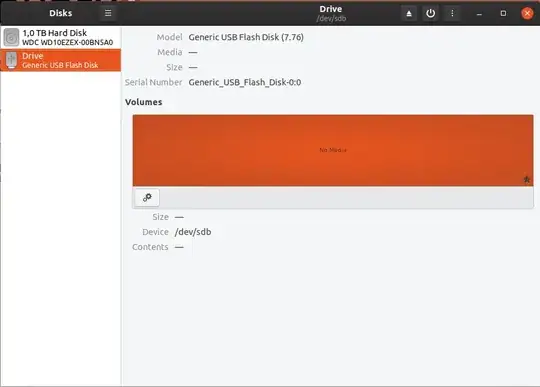I tried to make a bootable windows drive with a 16GB flash drive and an error occurred making the drive unrecognizable by the system. I've tried all ports of the pc and not worked, tried all ports in another computer and nothing. The GParted not recognize it too.
Here is my system info:
System: Kernel: 5.3.0-26-generic x86_64 bits: 64 compiler: gcc v: 9.2.1 Desktop: Gnome 3.34.1 wm: gnome-shell dm: GDM3 Distro: Ubuntu 19.10 (Eoan Ermine) Machine: Type: Desktop Mobo: ASRock model: H81M-HG4 serial: <root required> UEFI: American Megatrends v: P1.20 date: 12/06/2013 CPU: Topology: Dual Core model: Intel Pentium G3220 bits: 64 type: MCP arch: Haswell rev: 3 L2 cache: 3072 KiB flags: lm nx pae sse sse2 sse3 sse4_1 sse4_2 ssse3 vmx bogomips: 11996 Speed: 800 MHz min/max: 800/3000 MHz Core speeds (MHz): 1: 800 2: 800 Drives: Local Storage: total: 931.51 GiB used: 103.29 GiB (11.1%) ID-1: /dev/sda vendor: Western Digital model: WD10EZEX-00BN5A0 size: 931.51 GiB speed: 6.0 Gb/s serial: WD-WCC3F4594548
Here is the lsusb output:
lsusb Bus 002 Device 002: ID 8087:8000 Intel Corp. Bus 002 Device 001: ID 1d6b:0002 Linux Foundation 2.0 root hub Bus 001 Device 002: ID 8087:8008 Intel Corp. Bus 001 Device 001: ID 1d6b:0002 Linux Foundation 2.0 root hub Bus 004 Device 001: ID 1d6b:0003 Linux Foundation 3.0 root hub Bus 003 Device 005: ID 058f:1234 Alcor Micro Corp. Flash Drive Bus 003 Device 003: ID 1c4f:0002 SiGma Micro Keyboard TRACER Gamma Ivory Bus 003 Device 002: ID 275d:0ba6 USB OPTICAL MOUSE Bus 003 Device 001: ID 1d6b:0002 Linux Foundation 2.0 root hub
Disks screen:
The drive is bootable but when I start the pc, the grub recovery opens and says that the file system is unknown. Typing ls shows some partitions like (hd,msdos5) and (hd,0). Typing ls (hd,msdos5) shows that it is ext4 but with hd,0 is unknown. Can someone help me figure how to format it?
EDIT 1:
lsblk -f output:
NAME FSTYPE LABEL UUID FSAVAIL FSUSE% MOUNTPOINT
loop0
squash 0 100% /snap/gnom
loop1
squash 0 100% /snap/core
loop2
squash 0 100% /snap/gnom
loop3
squash 0 100% /snap/core
loop4
squash 0 100% /snap/kde-
loop5
squash 0 100% /snap/gnom
loop6
squash 0 100% /snap/core
loop7
squash 0 100% /snap/gnom
loop8
squash 0 100% /snap/vlc/
loop9
squash 0 100% /snap/core
loop10
squash 0 100% /snap/gnom
loop11
squash 0 100% /snap/gtk-
loop12
squash 0 100% /snap/kolo
loop13
squash 0 100% /snap/gtk-
loop14
squash 0 100% /snap/vlc/
loop15
squash 0 100% /snap/gnom
loop16
squash 0 100% /snap/gnom
sda
├─sda1
│ vfat 0575-3A5C 503,2M 2% /boot/efi
├─sda4
│
└─sda5
ext4 119910cb-d423-4866-91cd-37b4a2223df7 399,2G 20% /
lsblk -m output:
sudo lsblk -m NAME SIZE OWNER GROUP MODE loop0 956K root disk brw-rw---- loop1 54,7M root disk brw-rw---- loop2 4,2M root disk brw-rw---- loop3 89,1M root disk brw-rw---- loop4 260,7M root disk brw-rw---- loop5 14,8M root disk brw-rw---- loop6 89,1M root disk brw-rw---- loop7 4,2M root disk brw-rw---- loop8 202,9M root disk brw-rw---- loop9 54,6M root disk brw-rw---- loop10 156,7M root disk brw-rw---- loop11 44,9M root disk brw-rw---- loop12 15,8M root disk brw-rw---- loop13 44,2M root disk brw-rw---- loop14 202,9M root disk brw-rw---- loop15 14,8M root disk brw-rw---- loop16 160,2M root disk brw-rw---- sda 931,5G root disk brw-rw---- ├─sda1 512M root disk brw-rw---- ├─sda4 1K root disk brw-rw---- └─sda5 539,8G root disk brw-rw----
The tool used to create the install drive was WoeUSB command line. The attributes was the following:
woeusb --tgt-fs NTFS --device ISO_PATH /dev/sdb
After the execution, an error occurred and some files related to GRUB wasn't copied into the media.
I removed the media without "eject" it from system.
EDIT 2:
I have tried mkusb and it cant recognize the pendrive. Here is the output:
Select version of mkusb (d/e/n/b/q) d dus 12.3.9 Live drive, that is booted from: /dev/sda No suitable target device found p_target: target=/dev/ No target device or bad target device p_clean: wipe the first Mibibyte Live drive, that is booted from: /dev/sda No suitable target device found p_target: target=/dev/ No target device or bad target device p_clean: wipe the whole device - it can take very long time Live drive, that is booted from: /dev/sda No suitable target device found p_target: target=/dev/ No target device or bad target device p_clean: clean if necessary and return clean if necessary and quit
The fact that the pendrive is still bootable and in the grub rescue the ls command list some of it's partitions I believe that it is still alive. But the system or any tool can't see it. Only the lsusb and drivers see the device. Maybe there is another way to format the pendrive.

sudo lsblk -fandsudo lsblk -mand edit the original question to show the result.